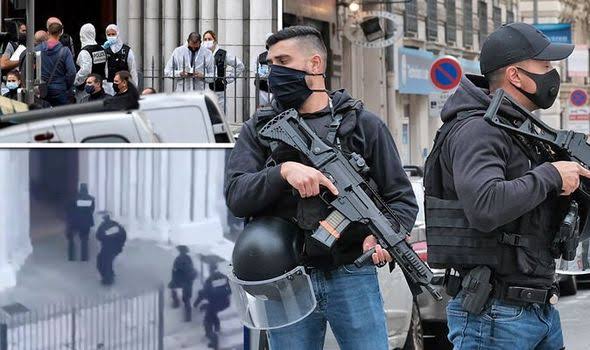
A French court has sentenced a Tunisian man to life imprisonment without the possibility of parole for the 2020 knife attack that resulted in the deaths of three individuals in a church located in Nice.
Brahim Aouissaoui, 25, acknowledged his involvement in the assault during the trial but stated that he could not recall the specific details of the event.
This attack occurred less than two weeks after the murder of history teacher Samuel Paty by a Chechen refugee and was part of a series of violent incidents attributed to Islamist extremists in France since 2015.
Prosecutors reported that Aouissaoui, armed with a kitchen knife, nearly decapitated 60-year-old Nadine Vincent, inflicted approximately 25 stab wounds on 44-year-old Franco-Brazilian mother Simone Barreto Silva, and slit the throat of 55-year-old sacristan Vincent Loques, who was a father of two daughters.
The ruling aligns with the prosecutors’ request for a life sentence without the possibility of parole, which is the harshest penalty available under French law.
Aouissaoui has asserted that the murders were a “legitimate” act of revenge against “the West” for the deaths of “innocent” Muslims.
Earlier on Wednesday, one of the public prosecutors remarked that the defendant was driven by “jihadist ideology.”
“It’s not terrorism,” the accused shouted, leading his own attorney to urge him to remain silent.
Aouissaoui sustained serious injuries when police shot him following the attack and previously claimed he had no recollection of the incident.
However, his medical evaluation showed no signs of brain damage, and a psychiatric assessment determined that his judgment was not impaired during the events.
Aouissaoui arrived in Europe from Tunisia just a month prior to the attack, first making the perilous journey across the Mediterranean to Italy before traveling overland to France.
See more: Musk gets star turn at first cabinet meeting of Trump’s second term
On the day of the attack, he entered the Basilica of Notre-Dame in Nice, carrying a copy of the Koran, three knives, and two mobile phones, as stated by prosecutors.
He comes from a large family in the Tunisian city of Sfax.
His mother mentioned that he worked as a motorcycle repairman and noted his increasing devotion to prayer in the years leading up to his departure.
Prosecutors indicated that he had consumed alcohol and smoked cannabis before becoming radicalized in late 2018.



